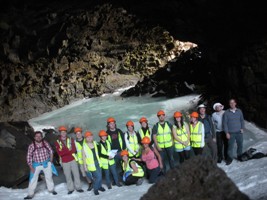Celebrating 60 years of microbiology at University of Reading
Release Date 07 September 2012

The country's longest running degree programme in microbiology, taught at the UK's first ever Department of Microbiology, is celebrating 60 years of excellence this year, with a celebratory event on Friday 7 September.
60 years of microbiology in pictures >>>
The first unified BSc degree in Microbiology in the UK was launched at the University of Reading in 1952, following the establishment of the Department in the previous year. Since then, the Department (now part of the School of Biological Sciences) has played a leading role in microbiology research in the UK, exemplified by visits by many eminent microbiologists including seven Nobel Laureates such as Alexander Fleming. In more recent times, the Department of Microbiology hosted a visit by Her Majesty The Queen, to open new buildings as part of the celebration of the centenary of university education in Reading in 1992.
On his appointment to the Foundation Chair of Microbiology in 1951, Professor BCJG Knight, the first Head of the Department, already had an international reputation for his pioneering work on nutritional requirements of micro-organisms and the action of bacterial toxins. He was directly involved in developing the second world war immunisation programme against tetanus and gas gangrene, he helped establish the Society for General Microbiology in 1945 and was founding editor of the Journal of General Microbiology (now Microbiology). In accord with his belief of the study of Microbiology as a science, Knight built on the existing expertise in agricultural bacteriology incorporating the study of algae, fungi, protozoa and viruses. The ensuing years and later availability of high containment facilities saw the development of Virology to a level on a par with bacteriology which together features the strength of Microbiology at Reading today.
Some research highlights of past Reading microbiologists include: contribution to the world-wide eradication of smallpox (Prof Colin Kaplan); the rare honour of having a species named after one (Methylobacterium zatmanii, Dr Len Zatman for his work on one-carbon compounds); elucidation of attenuation of polio virus and appointment to the government's Spongiform Encephalopathy Advisory committee following the 1996 BSE outbreak (Prof Jeff Almond); Fleming award in 1995 to Dr Jane McKeating for her work on HIV.
Over the last 10 years, with the aid of genomic and structural biology technology, microbiologists at Reading have continued to probe fundamental processes in bacteria and viruses and their applications. Iron homeostasis in bacterial pathogens (uptake, storage and global regulation) is one area of research. Solving the assembly, structure and activity of surface molecules involved in host-pathogen interactions continues to be the focus of much successful research. A surface molecule of MRSA was shown to influence activity of platelets, detail of the assembly of a surface polymer of Yersinia pestis highlights potential for improved anti-plague vaccines, cryo electron microscopy of a membrane protein of SARS virus shows how it alters shape on entry and release from host cells and expertise in insect cell expression has been developed to study key components of many infectious agents including influenza virus, foot and mouth disease virus and prion protein.
The historical link of Reading with agriculture has also continued with recent studies on Rhizobium genetics and the influence of nutrient exchange between bacterium and host plant on nitrogen fixation as well as current studies on the identification of novel biocontrol compounds of plant disease, including bacteriophage therapy and bacterial control of aphids.
Today, the BSc in Microbiology remains popular with students and Microbiology at Reading boasts world-leading experts in virology and bacteriology, a vibrant community of young researchers and excellent teaching and research facilities. Students on the undergraduate degree learn the fundamental properties, genetics and physiology of diverse microbes, underpinned with knowledge of the host cell biology and immune system and a strong practical emphasis, including a field trip to volcanic in Iceland. Recent graduates have a 100% employment rate and have gone on to work for organisations such as the Medical Research Council, South East Water, Royal Berkshire Hospital, the Health Protection Agency and a range of international scientific companies.
Professor Simon Andrews, Head of Biomedical Sciences at the University of Reading, said: "We are proud of the illustrious history of microbiology at Reading and the leading role many former colleagues have played in furthering the understanding of infectious diseases. Today, we are continuing that legacy, conducting research into the function of viruses and viral proteins and many aspects of bacterial biology including host-pathogen interactions, iron homeostasis and protein secretion and teaching future generations of microbiologists to take forward this hugely important work."
A celebration of 60 years of microbiology at the University of Reading is being held on 7 September, with current and former members of staff and students being joined by microbiologists from professional and industry partner organisations such as SGM and the Society for Applied Microbiology, both with their origins linked to the University. Professor Wendy Barclay, a former member of staff at Reading will give an invited talk entitled ‘Transmission of influenza virus'
As part of the celebration, the AMS Wing, one of the main facilities in which teaching and research in microbiology takes place, will be renamed the Knight Building in memory of B C J G Knight DSc (1904 - 1981).
More information at www.reading.ac.uk/microbiology
